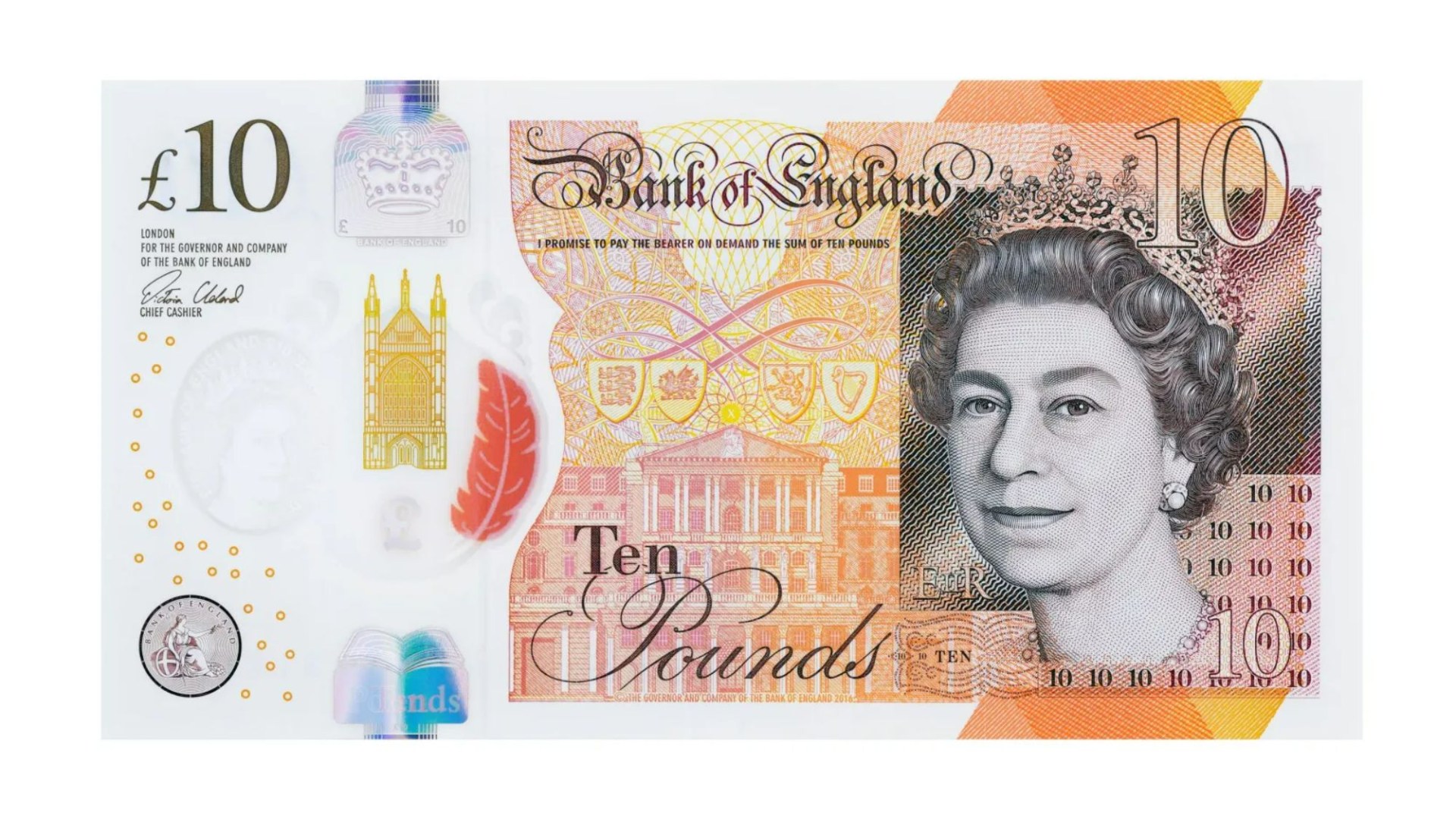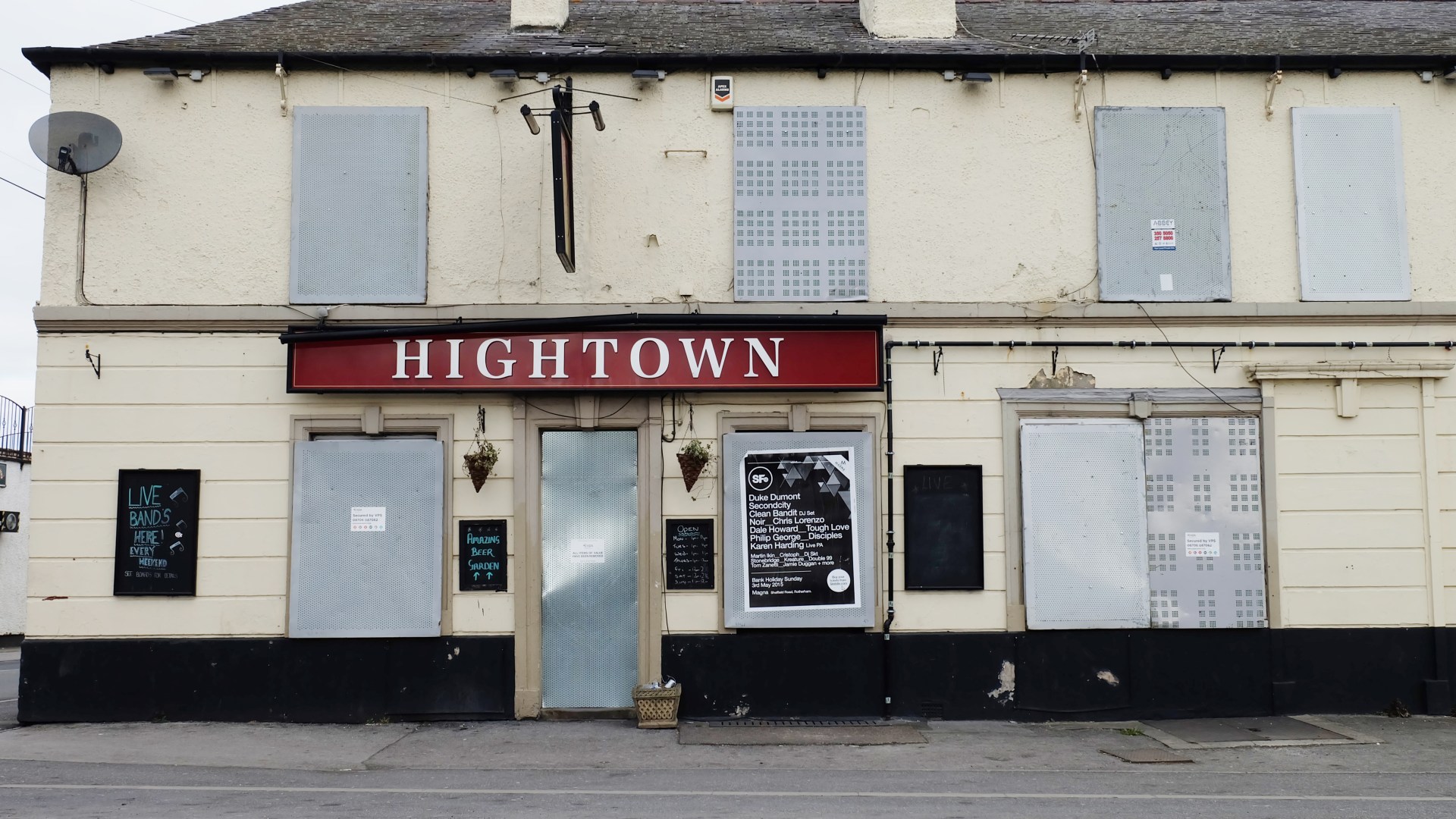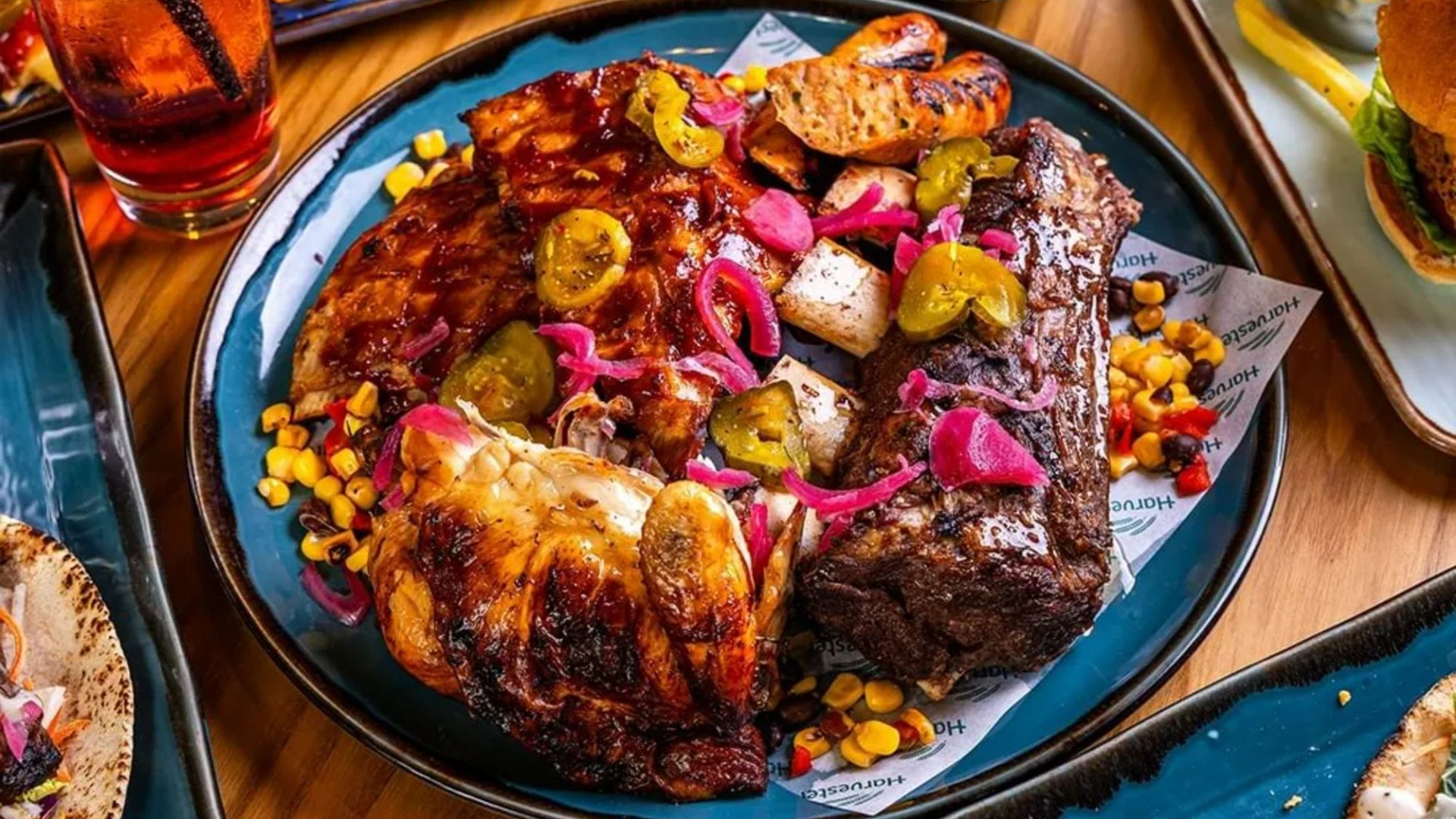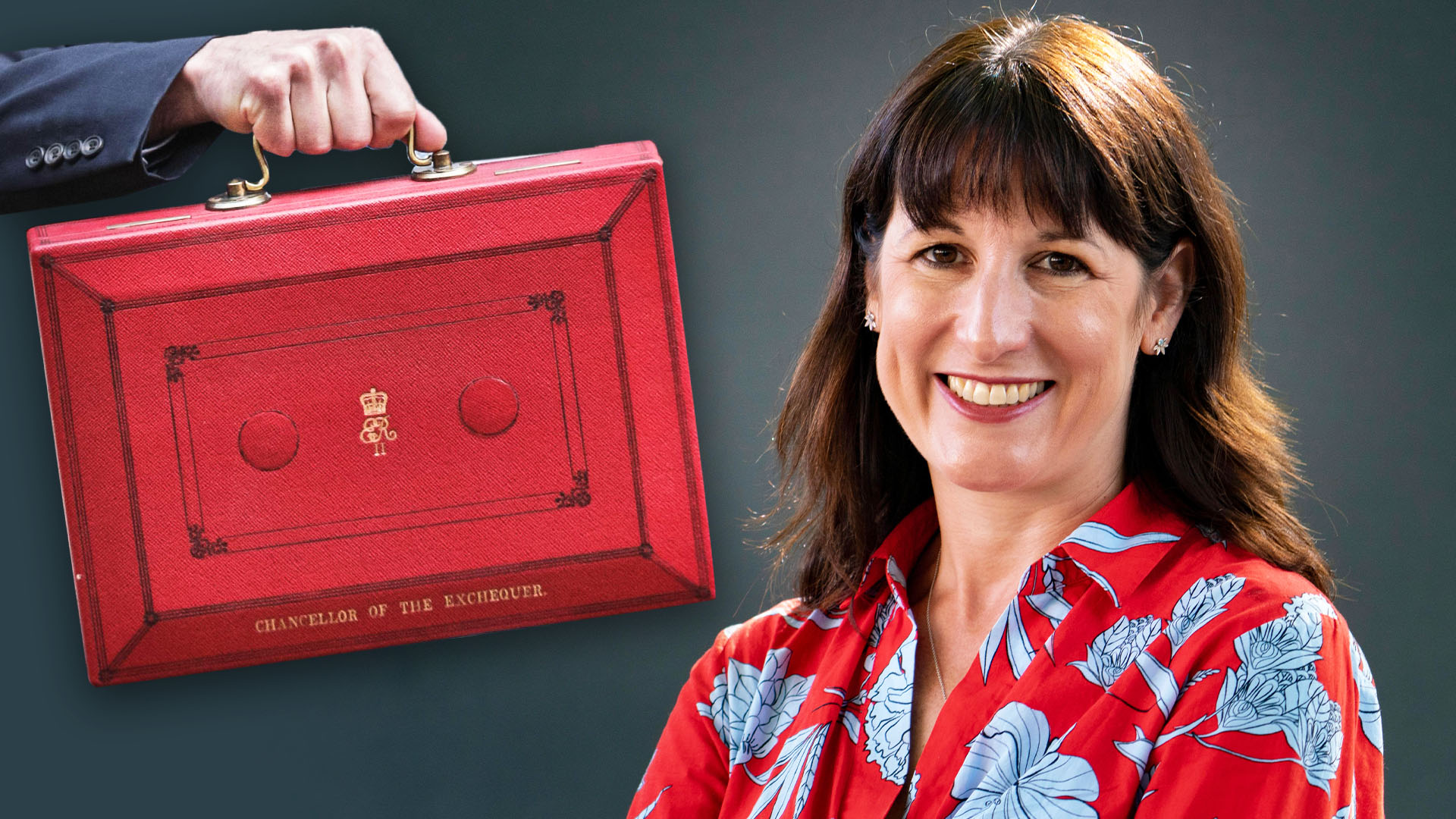Money
Ultra-rare note error sparks eBay bidding war as £10 sells for 25 times its value – can you spot what’s wrong?

THIS ultra-rare £10 note triggered an intense eBay bidding war – and sold for a whopping £255 – but can you tell what’s wrong?
The note was advertised as having a “rare mint error” that’s related to its printing.
The £10 is certainly rare, sporting a completely blank side that left bidders baffled.
Sold in September, the tenner attracted a whopping 27 bids from those desperate to get their hands on the bizarre note.
The poster even manage to nab themselves an extra £12.95 just for delivery, all the way from Denmark.
A blank note of this kind is practically impossible to find elsewhere.
From our research, the only other £10 blank note we could find appeared to sell for £156.11 on eBay.
It comes as a rare 50p coin sold for 200 its usual value because it was missing a tiny “mark”.
The King Charles Atlantic Salmon 50p was advertised as having “no privy mark” on eBay.
It later sold for a whopping £102 following 23 bids from eager collectors.
A privy mark is a tiny crown symbol stamped onto some coins on the “heads” or “obverse” side – or on the rim.
In the case of the King Charles Atlantic Salmon 50p, first minted in 2023 in celebration of Charles‘ ascension of the throne, the privy mark is a small Tudor crown.
It can be spotted just behind the King’s head.
How to spot rare coins and banknotes
Rare coins and notes hiding down the back of your sofa could sell for hundreds of pounds.
If you are lucky enough to find a rare £10 note you might be able to sell it for multiple times its face value.
You can spot rare notes by keeping an eye out for the serial numbers.
These numbers can be found on the side with the Monarch’s face, just under the value £10 in the corner of the note.
Also if you have a serial number on your note that is quite quirky you could cash in thousands.
For example, one seller bagged £3,600 after spotting a specific serial number relating to the year Jane Austen was born on one of their notes.
You can check if your notes are worth anything on eBay, just tick “completed and sold items” and filter by the highest value.
It will give you an idea of what people are willing to pay for some notes.
But do bear in mind that yours is only worth what someone else is willing to pay for it.
This is also the case for coins, you can determine how rare your coin is by looking a the latest scarcity index.
The next step is to take a look at what has been recently sold on eBay.
Experts from Change Checker recommend looking at “sold listings” to be sure that the coin has sold for the specified amount rather than just been listed.
What are the most rare and valuable coins?
Money
Pubs face widespread closures if they’re hit in next week’s Budget, industry bosses warn

PUBS face widespread closures if hit in the Budget, an industry boss has warned — as many make just 12p profit per pint.
David McDowall has urged Chancellor Rachel Reeves to throw the licensed trade a lifeline next week.
Landlords have had a 75 per cent reduction in business rates since Covid.
But that is due to end in April and losing it would cost them an extra £2.5billion, figures show.
Mr McDowall, chief exec of the Stonegate Group which includes the Slug & Lettuce and Yates’s, said publicans had faced a storm of challenges since the pandemic.
They include high inflation, soaring energy costs and pressure on consumer spending.
He noted the British Beer and Pub Association recently revealed boozers make 12p profit per pint.
Mr McDowall added: “Landlords don’t have any more to give.
“Removing that rate relief would prove very costly for pubs, bars, restaurants and cafes.”
Senior hospitality industry figures have also asked the Chancellor to extend the freeze on alcohol duty — due to end on February 1.
The Treasury said it was pledged to support businesses such as pubs.
Money
Corner shop with over 1,000 locations selling Terry’s Chocolate Orange for just £1 so shoppers can stock up for Xmas

A CORNER shop is selling the beloved Terry’s Chocolate Orange for just £1 – so shoppers can stop up for Christmas.
The deal can be found in One Stop, which has over 1,000 across the country.
Flavours include the classic original, Chocolate Mint, and Chocolate Orange Toffee Crunch.
News of the discount was posted in the Extreme Couponing and Bargains UK Facebook group, garnering 125 reacts and 146 comments.
Users were quick to tag family and friends in the comments, with one saying: “May have to go get some mint ones.”
Another mysteriously wrote: “I will have to grab some for our Christmas pudding project.”
The £1 price tag is a reduction from the usual £1.75 – and will be available until November 5.
Chocoholics can find their local store at www.onestop.co.uk/store-finder/ to shop the deal.
It is the best discount out there for Terry’s lovers, with Chocolate Oranges currently on sale for £1.50-£1.65 at Tesco, £1.50 at Asda, and £1.50 at Ocado down from £2.
It comes just months after Terry’s launched a brand-new flavour of Chocolate Orange – weirdly enough, without the “orange”.
The Chocolate Milk treat, nicknamed “Chocolate No Orange”, hit B&M in August.
One confused customer wrote: “I’m sorry but it’s a Terry’s chocolate orange. It’s in the name lol.”
In other exciting news for chocoholics, a so-called “extinct” chocolate Cadbury’s bar – the Fuse bar – was spotted in miniature form at B&M.
Meanwhile, shoppers raved about a new type of M&M – the Candy Popcorn M&M Minis.
And Nestle added a new chocolate to its Quality Street “Favourites Golden Selection” pouch: the Toffee Penny.
How to save money on chocolate

WE all love a bit of chocolate from now and then, but you don’t have to break the bank buying your favourite bar.
Consumer reporter Sam Walker reveals how to cut costs…
Go own brand – if you’re not too fussed about flavour and just want to supplant your chocolate cravings, you’ll save by going for the supermarket’s own brand bars.
Shop around – if you’ve spotted your favourite variety at the supermarket, make sure you check if it’s cheaper elsewhere.
Websites like Trolley.co.uk let you compare prices on products across all the major chains to see if you’re getting the best deal.
Look out for yellow stickers – supermarket staff put yellow, and sometimes orange and red, stickers on to products to show they’ve been reduced.
They usually do this if the product is coming to the end of its best-before date or the packaging is slightly damaged.
Buy bigger bars – most of the time, but not always, chocolate is cheaper per 100g the larger the bar.
So if you’ve got the appetite, and you were going to buy a hefty amount of chocolate anyway, you might as well go bigger.
Money
What’s next for annuities? Pension experts reveal how to get the best deal for your retirement

PENSION annuity rates and sales are rising and experts say now is a good time to buy one.
But the trick is to find the best deal for your old age.
Ellie Smitherman talks you through it . . .
IS AN ANNUITY RIGHT FOR YOU?
ANNUITIES are retirement plans pensioners can buy to provide them with a fixed regular income for the rest of their life.
Rates are usually shown as how much money you will receive per year for every £100,000 you pay in.
For example, an annuity rate of 5 per cent would mean you get £5,000 for every £100,000 you invest – so if you paid an annuity provider £50,000, you would get £2,500 a year.
If you buy an annuity, you can opt to take a quarter of your pension pot as a tax-free lump sum.
The rest is then converted into a taxable lifetime income.
Exactly how much an individual gets from an annuity depends on their personal circumstances, such as if they are in good health, their life expectancy and how much their pension is worth.
Annuity rates have surged in recent years.
Average annuity rates for a 65-year-old are currently 7.18 per cent, up from 5.11 per cent in January 2022.
The latest data from the annuity comparison tool of financial services firm Hargreaves Lansdown’s shows a 65-year-old with a £100,000 pension pot can get up to £7,146 a year.
This is up 43 per cent on what they would have got just three years ago.
But money paid from an annuity is subject to income tax.
And taking money from a pension in a lump sum can affect your means-tested benefits – they could be reduced or even stopped.
What’s next for rates?
RETIREES are rushing to lock in high rates, says Helen Morrissey, head of retirement analysis at Hargreaves Lansdown.
This is because many think the Bank of England will cut interest rates in the next few months, and this could have a negative impact on annuity rates.
Helen told The Sun: “After years on the sidelines of the retirement income market, annuities are enjoying their time in the sun, as increasing interest rates pushed incomes skyward.”
Emma Watkins of pension provider Scottish Widows added: “While it’s hard to predict the future, many think annuity rates will follow the base rate down over the next few years – while staying well above historic lows.”
But experts urge retirees not to buy too much into the predictions.
Lorna Shah, managing director of Legal & General Retail Retirement, said: “While some commentators are suggesting annuity rates might change, economic and political uncertainties mean annuity rates can be very hard to predict.
“Instead of trying to make a decision based on rates, it’s important for people to think about personal needs and how different products can work together to give them the best result over the long term.”
HOW TO GET THE BEST DEAL
AS you get closer to retirement age, your pension provider will send you information about the value of your pension pot and the options available to you to take money from it.
Some providers can offer you an income directly.
But remember, you don’t have to take an annuity offered by your existing provider.
Buying an annuity is usually an irreversible decision so it’s crucial to consider your options, choose the right type and get the best deal you can.
Research by Hargreaves Lansdown found the difference between different providers’ rates can be worth thousands in retirement.
So shop around for your annuity – it almost always gives you a higher income in retirement.
Use tools such as the Money Helper’s annuity comparison tool, or use annuity brokers to find the best deals currently available on the market and tailored to your circumstances.
You can find a broker online but check reviews and fees.
Only non-advised providers will give you a quote without you taking advice first.
They will simply offer you the best rate they can find on the market.
There may be annuity providers offering higher rates via only a financial adviser.
If you are close to retirement and unsure about annuities or making the most of your pension pot, Pension Wise can help.
It’s a free service from government-backed financial guidance adviser, MoneyHelper.
To find an independent financial adviser, see the Unbiased website, but you will likely need to pay for their advice.
You can also compare annuities yourself on the Annuity Ready website .
If unsure how much to save, the Retirement Living Standards website shows the cost of different retirement lifestyles.
Then use a retirement income calculator to see how much you need to save to reach the level you desire.
Bear in mind there are lots of types of annuities so do your research and get advice to find the best fit for you.
There are pitfalls, too, such as the fact you cannot change your mind – annuities are a lifelong buy so you need to be certain.
This also means if there’s a chance your income needs might change drastically in the future, an annuity might not be the best option for you.
Remember not to automatically accept the annuity rate offered by your pension provider without checking what is on offer across the rest of the market.
THE BEST ALTERNATIVES
IF you want more flexibility over your income you might want to consider a different approach.
Most retirees now opt to leave their pension invested in the stock market, and take income as and when they need it, via “drawdown”.
As with an annuity, you can withdraw a quarter as a tax-free lump sum, with the rest taxed as income.
Drawdown is more flexible than an annuity, and returns may be higher, but savings are exposed to greater volatility.
If there is a stock market crash, the fund value will fall, so your income needs may not be met.
If you are considering a draw-down, seek financial advice.
You are not limited to picking one option. You can mix and match.
So you could use some of your pot to buy an annuity and leave the rest invested to draw an income from it.
FIVE FACTORS KEY TO RATE YOU’LL GET
VARIOUS factors impact exactly how much income you get . . .
- GILT YIELDS: Annuity providers tend to fund them using returns from government bonds called gilts. The Government pays the annuity provider a fixed interest amount, tied to the Bank of England interest base rate. When the base rate rises, gilt yields also increase, subsequently boosting annuity rates, as observed in recent years.
- THE VALUE OF YOUR PENSION: The size of your pot is the primary factor determining your annuity income. The more savings you allocate to buy an annuity, the higher your income will be.
- AGE AND LIFE EXPECTANCY: How long you are expected to live significantly influences the annuity rate you are offered. The more years this is, the lower your rate, as the provider will be paying you for a longer period. For example, a 60-year-old will typically receive a lower income than a 70-year-old.
- YOUR HEALTH: Poor health, smoking or being overweight can lead to a shorter life expectancy, which may qualify you for a better annuity rate. It is crucial to declare any health conditions to your provider.
- YOUR POSTCODE: Annuity providers use your postcode to estimate life expectancy. If you reside in an area with a lower-than-average life expectancy, you may be offered a slightly higher rate.
‘There’s been a cloud over my solar power payments’
Q: I HAVEN’T been paid for my solar panels in almost nine months and I don’t know why.
I got them in 2011 and my energy supplier, Ovo, usually gives me money for energy I generate every three months.
But I haven’t been paid since February this year, covering from December 2023.
I have complained but haven’t had a straight answer as to what’s causing the delay. Can you help?
Leighton Reardon of Blackwood, Caerphilly
A: SOLAR panels can be a great long-term investment, as your energy supplier should reimburse you for any energy you generate yourself and supply back to the grid.
Unfortunately, there are often requirements you have to follow to ensure you keep getting your payments.
In your case, for example, Ovo Energy explained that you need to submit a “meter verification” every two years.
This involves sending a photo of your meter to the firm so it can check your latest reading.
You were supposed to submit your latest photo around July 2023, but Ovo said it didn’t receive it until August this year.
A spokesperson for the firm said it sent you a reminder in February.
But you clearly had not realised this was stopping you receiving your payments, and I’m concerned about why this was not made clear when you repeatedly called to complain.
You said staff on the phone “fobbed you off” and didn’t understand the problem.
I have asked Ovo to investigate, as I feel your problem could have been easily resolved over the phone.
Ovo has now reached out to explain what happened and what you need to do in future.
And a spokesperson said you will now be paid for the full period from December 2023 to September 2024 by early November, which you are happy with.
A spokesperson for Ovo said: “We’re glad to put this right so Mr Reardon can benefit from his panels.
“Our team continues to be on hand to support with any further questions.
“We encourage customers to contact us if they have any questions about their solar panels.”
Premium prizes take a hit
MILLIONS of Premium Bond holders will see their chances of winning cash tumble next month.
National Savings & Investments has slashed the prize fund rates for the second time this year in a blow to savers hoping to score a win.
Ellie Smitherman explains what you need to know . . .
WHAT IS CHANGING? Premium Bonds are a type of savings account that doesn’t offer interest payments like conventional accounts.
Instead, you’re given the chance to win a prize in the draw every month.
The prize fund rates are to be cut to 4.15 per cent from 4.4 per cent from December.
Savers will see their chances of winning in the monthly draw slide from 21,000 to 1 down to 22,000 to 1.
The prize fund was already cut earlier this year, falling from 4.65 per cent in March.
NS&I is also cutting interest rates for Direct Saver and Income Bonds to 3.75 per cent from 4 per cent where it has been since November 2020.
HOW MUCH CAN YOU WIN? There will continue to be two winners of the top £1million prizes from December’s draw.
And the number of the lowest £25 prizes will increase from 1.49m to an estimated 1.5million in December.
But the number of winnings between the biggest and smallest prize will all fall.
Overall, there will be an expected 5,726,438 prizes worth £435,686,300 in December, down from 5,991,306 prizes worth £461,330,525 this month.
Each £1 you put in Premium Bonds is an entry into the monthly prize draw.
All bonds have an equal chance of winning and the more you buy, the greater your chances.
SHOULD I CASH IN? Two thirds of Premium Bonds holders have never won, according to recent figures from a Freedom of Information reguest obtained by savings platform AJ Bell.
These savers may have missed out on significant returns in a higher paying cash account or by investing money – particularly if they have held the bonds for a long time.
If you are looking to make a decent and reliable return on your cash, numerous savings accounts pay a better rate.
For example, you can currently earn 5 per cent interest with app-based provider Chip on its easy access account.
It’s worth noting that Premium Bond winnings are tax-free.
Anyone who has used up their annual ISA limit or personal savings allowance could benefit by saving into Premium Bonds.
Premium Bonds are government-backed, meaning your money is safe and there’s no risk of losing it.
But other banks and building societies are protected by the Financial Services Compensation Scheme, which covers up to £85,000 of money per person, per financial institution.
Money
Harvester selling its biggest ever plate as fans hail whopping 3,769-calorie mountain of meat for £50

HARVESTER has launched its biggest plate of food yet – a gut-busting mountain of meat for £50.
The restaurant chain has added the enormous dish to its latest menu and it contains a whopping 3,769 calories.
Greedy diners can feast on half a rotisserie chicken, a half rack of BBQ ribs, a short of beef rib and a massive cheddar and jalapeño sausage.
The giant plate is finished with a heap of salsa, pink pickled onions, corn bread, chips and coleslaw.
If that’s not enough, food fans can still top it off with a bowl of Harvester’s famous self-service salad bar.
The Ultimate Rib Roundup is described as a ‘sharer’ dinner on the menu and comes with a price tag of £49.99.
Harvester, however, has told customers: “Perfectly grilled, packed with flavour and made for sharing (or keeping all to yourself).”
Brenda Gliddon visited her local branch in Kent with her grown-up son to try the Ultimate Rib Roundup.
She said: “My son can out eat anyone I know but even he left some.” Other Harvester fans have also been eyeing up the new calorific dish as a meal for one.
One wrote on the restaurant chain’s Facebook official page: “I love sharing but I’d rather keep this all to myself!”
Another added: “That’s a single portion!”
Tagging in a pal, third commented: “You’ve got to try this. You might get more than 4 ribs on your plate!”
The Ultimate Rib Roundup is available in all 165 UK branches of Harvester.
It has been added as a new addition to the eatery’s Grills and Combos section of the menu.
Listed as a ‘Supreme Flavour Fan Sharer’, the description reads: “A hearty feast for true grill lovers: half of our succulent rotisserie chicken, a half rack of BBQ glazed ribs, a tender short beef rib and a Cheddar & jalapeño sausage paired with charred corn & black bean salsa and pink pickled onions.
“Served with sage & onion seasoned chips, our new hot honey drizzled corn bread and hot slaw.”
How to save money eating out
THERE are a number of ways that you can save money when eating out. Here’s how:
Discount codes – Check sites like Sun Vouchers or VoucherCodes for any discount codes you can use to get money off your order.
Tastecard – This is a members club where you pay to have access to discounts worth up to 50 per cent off at thousands of restaurants. It costs £4.99 a month or £34.99 for the year.
Loyalty schemes – Some restaurants will reward you with discounts or a free meal if you register with their loyalty scheme, such as Nando’s where you can collect a stamp with every visit. Some chains like Pizza Express will send you discounts for special occasions, such as your birthday, if you sign up to their newsletter.
Voucher schemes – Look out for voucher schemes offered by third party firms, such as Meerkat Meals. If you compare and buy a product through CompareTheMarket.com then you’ll be rewarded with access to the discount scheme. You’ll get 2 for 1 meals at certain restaurants through Sunday to Thursday.
Student discounts – If you’re in full-time education or a member of the National Students Union then you may be able to get a discount of up to 15 per cent off the bill. It’s always worth asking before you place your order.
Money
I won £200k on People’s Postcode Lottery and lost half a stone – I’ve had sleepless nights & still think it’ll disappear

A WINNING Postcode Lottery player bagged an eye-watering £200,000 and lost half a stone.
Alison and Tim Browne, from Breaston, Derbyshire, were gobsmacked when they discovered the lucrative jackpot.
The couple were one of three households who scooped the windfall in the Postcode Lottery Millionaire Street draw last week.
Mum-of-two Alison said their jackpot has seen her drop half a stone within a week due to lack of sleep.
“But it’s good! You have dreams that you have won lots of money, but then you wake up and think, ‘Damn, it’s a dream’,” she said.
“This is how I felt every night this week when I managed to get to sleep at 3am. Then I woke up and thought, ‘No, it’s not a dream!’
“Never in my wildest dreams did I think we would win this much.”
Tim admitted he didn’t even enter the competition – but his wife unknowingly had.
He said: “I can’t believe it. I’m just glad she didn’t phone to tell me the amount when I was driving!
“I didn’t even know she was doing People’s Postcode Lottery, to be honest.”
An overjoyed Alison added: “It’s a fantastic feeling and I can’t stop smiling. But we’re going to have a big, big party on the street.
“It’s wonderful. We’ve known George and Paul for over 30 years and we get on really, really well.
“It’s a lovely street, lovely neighbours, and a lovely place to live.
“I don’t know what to think. This is life-changing, it really is.”
The pair are plan to splurge the cash on a lavish holiday to celebrate their 40th anniversary.
And, they will finally be able to tick riding on the iconic Orient Express off their bucket-list.
Tim said: “It means everything. We always wanted to do the train trip across the Rockies in Canada and also the Orient Express.
“There’s lots of trips that we’ve never done and have never been able to do. And now we’ll be able to do them and that’s fantastic.”
Alison, a freelance school music exam coordinator, said: “We’ve been married 43 years now, but our 40-year anniversary fell during lockdown so we weren’t able to celebrate properly. Now we can do that.”
The couple share a son Matthew, who is autistic, and hailed the win for “the security this will bring him”.
Meanwhile, older son James, joked: “I’ll be happy with a pint in Spoons. It’s £6 a pint!”
Tim revealed he also dreams of welcoming a new puppy into the family to keep Pointer Finlay company.
The musician told how a new Gore-Tex waterproof jacket wouldn’t go a miss either.
Alison laughed: “If we get another dog we’ll need a house with a bigger garden.
“My son and daughter-in-law don’t want us to get another dog because they have to look after them if we go away.
“We’re all going away to Wales on holiday together next week so we can celebrate there.”
It comes as another lucky player who scooped a life-changing Postcode Lottery prize refused to believe she had won – until a key sign revealed it was fate.
Meanwhile, another punter doubled their £200,000 Postcode Lottery win by using a clever trick – make sure you don’t miss out.
Jo Deighton from Shoreham, West Sussex, was gobsmacked when she scooped nearly an eye-watering quarter of a million pounds.
Elsewhere, one Brit who bagged a £410,000 jackpot told how no one believed her – not even her husband.
Leyla Eaton’s jaw dropped after discovering she’d scooped the eye-watering prize.
The mum-of-two entered when she was struck by a “strong feeling” a huge windfall was coming her way.
How to play the People’s Postcode Lottery?

For just £12 a month, players can sign up through the official website to have a chance of winning millions of pounds.
Once signed up, players are automatically entered into every draw and prizes are announced every day of each month.
Tickets play for the Daily Prize, worth £1000 and revealed every single day.
Tickets could also win a jackpot of £30,000 for Saturday and Sunday’s Street Prize draws.
People’s Postcode Lottery also offers a £3million Postcode Millions draw each month – where your ticket plays for a share of the cash prize fund.
Winners are notified by email, text, post, or phone call, depending on the prize they win.
Jackpot winners are visited by the lottery team in person.
Money
Nine Budget predictions that Rachel Reeves could make including pensions shake-up and alcohol price rises

THERE’S less than a week to go until this year’s Budget, leaving many people wondering what the Government will announce.
The Budget gives an update on the government’s economic plans, which are based on official forecasts from the Office for Budget Responsibility (OBR).
It also gives Chancellor Rachel Reeves the chance to update Parliament on the government’s tax and spending plans for the next year.
Labour’s manifesto promise ruled out hikes to VAT, income tax rates and national insurance in line with its pledge to help “working people”.
The Government has so far refused to rule out several big tax changes, including a council tax reform and new pension rules.
Meanwhile, Sir Keir Starmer’s warning that the Labour Party’s first Budget in more than a decade “is going to be painful” has left many wondering what could be announced.
Here we take you through what could be in store.
Income tax
Experts suggest that Rachel Reeves could extend the “stealth” freeze on income tax thresholds for another two years.
The personal allowance, which is the amount that people can earn before they need to pay income tax, is frozen until 2028 but the Chancellor could extend it in next week’s Budget.
As worker’s wages rise in line with inflation this could drag thousands of people into higher tax brackets through fiscal drag.
Government sources have said that doing so would not breach Labour’s general election manifesto, which promised not to increase the rate of income tax.
The move could bring in as much as £7billion a year from 2028 onwards.
Capital gains tax
Another rumour is that Labour will make changes to capital gains tax in its Budget.
Capital gains tax is charged on the profit you make when you sell something that has increased in value.
Sir Keir Starmer has ruled out charging capital gains tax for first-time buyers, which is exempt under the current system.
Experts now predict that the rate charged for higher-rate taxpayers selling a second home will remain at 24%.
What is the Budget?
THE Budget is big news and where you’ll often hear announcements about taxes. But what exactly is it?
The Budget is when the Government outlines its plans for the economy including taxation and spending.
The Chancellor of the Exchequer delivers a speech in the House of Commons and announces plans for things like tax hikes, cuts and changes to Universal Credit and the minimum wage.
At the same time, the Office for Budget Responsibility (OBR) publishes an independent analysis of the UK economy.
Usually, the Budget is a once-a-year event and usually takes place in the Autumn, with a smaller update known as the Spring Statement.
But there have been exceptions in recent years when there have been more updates, or the announcements have taken place at different times, for example during the pandemic or when there is a General Election.
On the day of the Budget, usually a Wednesday, the Chancellor is photographed outside No 11 Downing Street with the red box.
She then heads to the House of Commons to deliver her speech, at around 12.30 following Prime Minister’s Questions (PMQs).
Changes announced in the Budget are sometimes implemented the same day, while others may not have a set date.
For example, a change to tobacco duty usually happens on the same day, pushing up the price of cigarettes.
Some tax changes are set to come in at the start of a new tax year, which is April 6.
Other changes may need to pass through Parliament before coming into law.
But the 20% tax when selling shares or other valuable assets such as paintings or furniture could be increased.
This move may not affect basic-rate taxpayers, who currently pay 10pc, although a change to their thresholds has not been ruled out.
The Government may also alter the current threshold at which capital gains tax is due.
At the moment the first £3,000 you make in profit for selling an item that has increased in value is tax-free.
But this threshold has been reduced several times by the previous Conservative government.
First from £12,300 in 2022-23, then to £6,000 in 2023-24.
Inheritance tax
The prime minister and chancellor could make multiple changes to inheritance tax, which currently has several exemptions and reliefs.
Inheritance tax is currently charged at 40% on the property, possessions and money of someone who has died if they are worth more than £325,000.
Fewer than one in 20 estates currently pays death duties as many estates fall below this threshold.
But the tax raises about £7 billion a year for the Government.
There are several exemptions and reliefs which mean you do not need to pay inheritance tax, including gifts or giving to charity.
It is thought that changes to several of these rules are being considered.
For example, gifts which are given less than seven years before you die may be taxed.
There are also exemptions if you leave land or pasture which is used to rear animals or to grow crops through agricultural relief.
It is not yet confirmed what changes will be made in the Budget on 30 October.
Employer national insurance contributions
Experts have suggested that the Chancellor could impose national insurance on employers’ pension contributions in the Budget.
Doing so could raise £15.4 billion, which would help to plug a £40billion funding gap in the public finances.
Employers currently pay national insurance for post workers earning more than £9,100 a year.
The amount they pay is equivalent to 13.8% of the employee’s earnings above this figure.
For an employee earning £30,000 the employer would pay around £2,884.20 in national insurance.
Former pensions minister Sir Steve Webb said that if the government put up the national insurance rate by 1% it could raise an extra £8 billion a year.
But he warns that it could leave millions of workers with lower wages and less generous pensions.
If an employer has to pay more tax then their costs will go up, so they would need to save money elsewhere.
They may do this by giving employees smaller pay rises or by reducing the amount that they pay into employees’ pensions.
Sir Steve said: “Changing national insurance contributions could leave hundreds of thousands of people with a poorer retirement.”
Pensions
The Government has so far failed to rule out changes to the lump sum you can take out of your pension without paying tax.
At the moment retirees can withdraw up to 25% of the total value of their pension tax-free, up to a maximum of £268,275.
But Labour is allegedly considering cutting the tax-free amount to £100,000 in a move which could raise around £2 billion.
It is not yet clear how this would work.
Another option being considered is to charge inheritance tax on pensions.
At present pensions are not considered to be part of your estate when you die, which means that you do not need to pay IHT on them.
But some suggest that Labour could change this in a move which could leave grieving families tens of thousands of pounds worse off.
What are the different types of pensions?
WE round-up the main types of pension and how they differ:
- Personal pension or self-invested personal pension (SIPP) – This is probably the most flexible type of pension as you can choose your own provider and how much you invest.
- Workplace pension – The Government has made it compulsory for employers to automatically enrol you in your workplace pension unless you opt out.
These so-called defined contribution (DC) pensions are usually chosen by your employer and you won’t be able to change it. Minimum contributions are 8%, with employees paying 5% (1% in tax relief) and employers contributing 3%. - Final salary pension – This is also a workplace pension but here, what you get in retirement is decided based on your salary, and you’ll be paid a set amount each year upon retiring. It’s often referred to as a gold-plated pension or a defined benefit (DB) pension. But they’re not typically offered by employers anymore.
- New state pension – This is what the state pays to those who reach state pension age after April 6 2016. The maximum payout is £203.85 a week and you’ll need 35 years of National Insurance contributions to get this. You also need at least ten years’ worth to qualify for anything at all.
- Basic state pension – If you reach the state pension age on or before April 2016, you’ll get the basic state pension. The full amount is £156.20 per week and you’ll need 30 years of National Insurance contributions to get this. If you have the basic state pension you may also get a top-up from what’s known as the additional or second state pension. Those who have built up National Insurance contributions under both the basic and new state pensions will get a combination of both schemes.
Stamp duty
Stamp duty land tax is due if you buy a property or a piece of land which is worth more than a certain price in England and Northern Ireland.
In 2022 the rate at which people start to pay it was increased from £125,000 to £250,000 for second-steppers.
Meanwhile, for first-time buyers, it rose from £300,000 to £450,000.
A discounted rate on property purchases of up to £625,000 was also introduced.
But these higher thresholds are only due to last until March 31 2025, after which point they will return to the original levels.
So far Labour has not committed to extending them.
If the higher thresholds are not extended then it could mean first-time buyers are slapped with tax bills which are £15,000 higher than before.
Cash ISAs
Savers have been rushing to open a cash ISA before 30 October to protect themselves from any tax surprises which could be announced in the Budget.
Cash ISAs are a tax-free way to save towards your financial future or invest in the stock market.
Every tax year you can save up to £20,000 in one account or split your allowance across multiple accounts.
The tax year runs from 6 April to 5 April.
You can only pay into one Lifetime ISA in a tax year and the maximum amount you can deposit is £4,000.
There is no limit on how much cash you can stash away over your lifetime.
Meanwhile, savers can be forced to pay tax on their nest eggs if they go over the personal savings allowance.
Basic-rate taxpayers can earn up to £1,000 in interest before they need to pay tax on their savings.
Higher-rate taxpayers can earn up to £500 in interest, while additional-rate taxpayers get no allowance.
But The Resolution Foundation, a think tank, has previously suggested that the government should slash the amount that can be saved into an ISA to £1,000.
They argue that by not having a cap the accounts mostly benefit those with lots of disposable income.
Alcohol duty
It has been reported that the Chancellor is considering increasing alcohol duties in the Budget.
Rachel Reeves has not ruled out pushing up the tax on spirits, beer and wine, which would raise an extra £800 million next year.
Alcohol duty is charged on all drinks which are more than 1.2% ABV strength, either at the point of production or when they are imported.
Usually, alcohol duty rises each year in line with inflation unless the Chancellor chooses to freeze it.
Although inflation is set to hit 2% next year, industry sources have said that alcohol duties could be pushed up to more than 6%.
But higher taxes could mean higher prices, which could deter drinkers and cause them to buy less.
Fuel duty
Drivers could be hit in the pocket if Labour decides to make changes to fuel duty in the Budget.
Fuel duty rates have been frozen since 2011-12.
It was cut by a further 5p in 2022 by the Conservatives in response to soaring fuel prices at the start of the war in Ukraine.
The RAC has predicted that the 5p cut could be scrapped, which could increase the cost of filling up a tank by an average of £3.30.
Do you have a money problem that needs sorting? Get in touch by emailing money-sm@news.co.uk.
Plus, you can join our Sun Money Chats and Tips Facebook group to share your tips and stories
-

 Science & Environment1 month ago
Science & Environment1 month agoHow to unsnarl a tangle of threads, according to physics
-

 Technology4 weeks ago
Technology4 weeks agoIs sharing your smartphone PIN part of a healthy relationship?
-

 Science & Environment1 month ago
Science & Environment1 month agoHyperelastic gel is one of the stretchiest materials known to science
-

 Science & Environment1 month ago
Science & Environment1 month ago‘Running of the bulls’ festival crowds move like charged particles
-

 Science & Environment1 month ago
Science & Environment1 month agoMaxwell’s demon charges quantum batteries inside of a quantum computer
-

 Science & Environment1 month ago
Science & Environment1 month agoX-rays reveal half-billion-year-old insect ancestor
-

 Technology1 month ago
Technology1 month agoWould-be reality TV contestants ‘not looking real’
-

 Science & Environment1 month ago
Science & Environment1 month agoSunlight-trapping device can generate temperatures over 1000°C
-

 Technology4 weeks ago
Technology4 weeks agoUkraine is using AI to manage the removal of Russian landmines
-

 Science & Environment1 month ago
Science & Environment1 month agoLiquid crystals could improve quantum communication devices
-

 Science & Environment1 month ago
Science & Environment1 month agoQuantum ‘supersolid’ matter stirred using magnets
-

 TV3 weeks ago
TV3 weeks agoসারাদেশে দিনব্যাপী বৃষ্টির পূর্বাভাস; সমুদ্রবন্দরে ৩ নম্বর সংকেত | Weather Today | Jamuna TV
-

 News3 weeks ago
News3 weeks agoMassive blasts in Beirut after renewed Israeli air strikes
-

 Technology3 weeks ago
Technology3 weeks agoSamsung Passkeys will work with Samsung’s smart home devices
-

 Football3 weeks ago
Football3 weeks agoRangers & Celtic ready for first SWPL derby showdown
-

 News3 weeks ago
News3 weeks agoNavigating the News Void: Opportunities for Revitalization
-

 Science & Environment1 month ago
Science & Environment1 month agoLaser helps turn an electron into a coil of mass and charge
-

 Science & Environment1 month ago
Science & Environment1 month agoA new kind of experiment at the Large Hadron Collider could unravel quantum reality
-

 Womens Workouts1 month ago
Womens Workouts1 month ago3 Day Full Body Women’s Dumbbell Only Workout
-

 News3 weeks ago
News3 weeks ago▶ Hamas Spent $1B on Tunnels Instead of Investing in a Future for Gaza’s People
-

 Business3 weeks ago
Business3 weeks agoWhen to tip and when not to tip
-

 Sport3 weeks ago
Sport3 weeks agoBoxing: World champion Nick Ball set for Liverpool homecoming against Ronny Rios
-

 MMA3 weeks ago
MMA3 weeks ago‘Uncrowned queen’ Kayla Harrison tastes blood, wants UFC title run
-

 Science & Environment1 month ago
Science & Environment1 month agoPhysicists have worked out how to melt any material
-

 Science & Environment1 month ago
Science & Environment1 month agoWhy this is a golden age for life to thrive across the universe
-

 Science & Environment1 month ago
Science & Environment1 month agoQuantum forces used to automatically assemble tiny device
-

 Technology4 weeks ago
Technology4 weeks agoMicrophone made of atom-thick graphene could be used in smartphones
-

 MMA3 weeks ago
MMA3 weeks agoDana White’s Contender Series 74 recap, analysis, winner grades
-

 Football3 weeks ago
Football3 weeks agoWhy does Prince William support Aston Villa?
-

 MMA3 weeks ago
MMA3 weeks agoPereira vs. Rountree prediction: Champ chases legend status
-

 News3 weeks ago
News3 weeks ago‘Blacks for Trump’ and Pennsylvania progressives play for undecided voters
-

 Sport3 weeks ago
Sport3 weeks agoMan City ask for Premier League season to be DELAYED as Pep Guardiola escalates fixture pile-up row
-
Business3 weeks ago
DoJ accuses Donald Trump of ‘private criminal effort’ to overturn 2020 election
-

 Technology3 weeks ago
Technology3 weeks agoThis AI video generator can melt, crush, blow up, or turn anything into cake
-

 Sport3 weeks ago
Sport3 weeks agoWales fall to second loss of WXV against Italy
-

 News1 month ago
News1 month ago▶️ Hamas in the West Bank: Rising Support and Deadly Attacks You Might Not Know About
-

 Technology1 month ago
Technology1 month agoMeta has a major opportunity to win the AI hardware race
-

 Technology4 weeks ago
Technology4 weeks agoRussia is building ground-based kamikaze robots out of old hoverboards
-

 Science & Environment1 month ago
Science & Environment1 month agoITER: Is the world’s biggest fusion experiment dead after new delay to 2035?
-

 Science & Environment1 month ago
Science & Environment1 month agoA slight curve helps rocks make the biggest splash
-

 Science & Environment1 month ago
Science & Environment1 month agoNerve fibres in the brain could generate quantum entanglement
-

 Science & Environment1 month ago
Science & Environment1 month agoNuclear fusion experiment overcomes two key operating hurdles
-

 MMA3 weeks ago
MMA3 weeks agoJulianna Peña trashes Raquel Pennington’s behavior as champ
-

 Sport3 weeks ago
Sport3 weeks agoAaron Ramsdale: Southampton goalkeeper left Arsenal for more game time
-

 Technology3 weeks ago
Technology3 weeks agoGmail gets redesigned summary cards with more data & features
-

 Technology3 weeks ago
Technology3 weeks agoMusk faces SEC questions over X takeover
-

 Science & Environment1 month ago
Science & Environment1 month agoHow to wrap your mind around the real multiverse
-

 Technology1 month ago
Technology1 month agoWhy Machines Learn: A clever primer makes sense of what makes AI possible
-

 Science & Environment1 month ago
Science & Environment1 month agoTime travel sci-fi novel is a rip-roaringly good thought experiment
-

 Technology3 weeks ago
Technology3 weeks agoMicrosoft just dropped Drasi, and it could change how we handle big data
-

 Sport3 weeks ago
Sport3 weeks agoSturm Graz: How Austrians ended Red Bull’s title dominance
-

 News3 weeks ago
News3 weeks agoFamily plans to honor hurricane victim using logs from fallen tree that killed him
-

 Entertainment3 weeks ago
Entertainment3 weeks agoNew documentary explores actor Christopher Reeve’s life and legacy
-

 Sport3 weeks ago
Sport3 weeks agoChina Open: Carlos Alcaraz recovers to beat Jannik Sinner in dramatic final
-

 Money3 weeks ago
Money3 weeks agoWetherspoons issues update on closures – see the full list of five still at risk and 26 gone for good
-

 Technology3 weeks ago
Technology3 weeks agoThe best budget robot vacuums for 2024
-

 MMA3 weeks ago
MMA3 weeks agoKetlen Vieira vs. Kayla Harrison pick, start time, odds: UFC 307
-

 Sport3 weeks ago
Sport3 weeks ago2024 ICC Women’s T20 World Cup: Pakistan beat Sri Lanka
-

 News1 month ago
News1 month ago▶️ Media Bias: How They Spin Attack on Hezbollah and Ignore the Reality
-

 News3 weeks ago
News3 weeks agoWoman who died of cancer ‘was misdiagnosed on phone call with GP’
-
Business3 weeks ago
Sterling slides after Bailey says BoE could be ‘a bit more aggressive’ on rates
-

 Technology3 weeks ago
Technology3 weeks agoTexas is suing TikTok for allegedly violating its new child privacy law
-
Business3 weeks ago
The search for Japan’s ‘lost’ art
-

 Business3 weeks ago
Business3 weeks agoStark difference in UK and Ireland’s budgets
-

 MMA3 weeks ago
MMA3 weeks agoPereira vs. Rountree preview show live stream
-

 Sport3 weeks ago
Sport3 weeks agoCoco Gauff stages superb comeback to reach China Open final
-

 Sport4 weeks ago
Sport4 weeks agoWorld’s sexiest referee Claudia Romani shows off incredible figure in animal print bikini on South Beach
-

 Technology3 weeks ago
Technology3 weeks agoEpic Games CEO Tim Sweeney renews blast at ‘gatekeeper’ platform owners
-
Business3 weeks ago
Bank of England warns of ‘future stress’ from hedge fund bets against US Treasuries
-

 Science & Environment3 weeks ago
Science & Environment3 weeks agoMarkets watch for dangers of further escalation
-

 Business3 weeks ago
Business3 weeks agoChancellor Rachel Reeves says she needs to raise £20bn. How might she do it?
-

 Technology3 weeks ago
Technology3 weeks agoOpenAI secured more billions, but there’s still capital left for other startups
-

 Technology3 weeks ago
Technology3 weeks agoThe best shows on Max (formerly HBO Max) right now
-

 MMA3 weeks ago
MMA3 weeks agoAlex Pereira faces ‘trap game’ vs. Khalil Rountree
-

 Football3 weeks ago
Football3 weeks agoSimo Valakari: New St Johnstone boss says Scotland special in his heart
-

 Technology3 weeks ago
Technology3 weeks agoJ.B. Hunt and UP.Labs launch venture lab to build logistics startups
-

 News3 weeks ago
News3 weeks agoGerman Car Company Declares Bankruptcy – 200 Employees Lose Their Jobs
-

 News3 weeks ago
News3 weeks agoHull KR 10-8 Warrington Wolves – Robins reach first Super League Grand Final
-

 MMA3 weeks ago
MMA3 weeks agoUFC 307 preview show: Will Alex Pereira’s wild ride continue, or does Khalil Rountree shock the world?
-

 MMA3 weeks ago
MMA3 weeks ago‘I was fighting on automatic pilot’ at UFC 306
-
News1 month ago
the pick of new debut fiction
-

 News1 month ago
News1 month agoOur millionaire neighbour blocks us from using public footpath & screams at us in street.. it’s like living in a WARZONE – WordupNews
-

 News3 weeks ago
News3 weeks agoLiverpool secure win over Bologna on a night that shows this format might work
-
Politics3 weeks ago
Rosie Duffield’s savage departure raises difficult questions for Keir Starmer. He’d be foolish to ignore them | Gaby Hinsliff
-
Business3 weeks ago
Head of UK Competition Appeal Tribunal to step down after rebuke for serious misconduct
-

 Money3 weeks ago
Money3 weeks agoPub selling Britain’s ‘CHEAPEST’ pints for just £2.60 – but you’ll have to follow super-strict rules to get in
-

 News3 weeks ago
News3 weeks agoBalancing India and China Is the Challenge for Sri Lanka’s Dissanayake
-

 News3 weeks ago
News3 weeks agoHeavy strikes shake Beirut as Israel expands Lebanon campaign
-

 TV3 weeks ago
TV3 weeks agoLove Island star sparks feud rumours as one Islander is missing from glam girls’ night
-

 TV3 weeks ago
TV3 weeks agoPhillip Schofield accidentally sets his camp on FIRE after using emergency radio to Channel 5 crew
-

 News3 weeks ago
News3 weeks agoHeartbreaking end to search as body of influencer, 27, found after yacht party shipwreck on ‘Devil’s Throat’ coastline
-

 Technology3 weeks ago
Technology3 weeks agoPopular financial newsletter claims Roblox enables child sexual abuse
-

 Health & fitness3 weeks ago
Health & fitness3 weeks agoNHS surgeon who couldn’t find his scalpel cut patient’s chest open with the penknife he used to slice up his lunch
-

 Technology3 weeks ago
Technology3 weeks agoIf you’ve ever considered smart glasses, this Amazon deal is for you
-

 Technology3 weeks ago
Technology3 weeks agoAmazon’s Ring just doubled the price of its alarm monitoring service for grandfathered customers
-

 Technology3 weeks ago
Technology3 weeks agoApple iPhone 16 Plus vs Samsung Galaxy S24+
-

 TV3 weeks ago
TV3 weeks agoMaayavi (මායාවී) | Episode 23 | 02nd October 2024 | Sirasa TV
-

 Technology3 weeks ago
Technology3 weeks agoHow to disable Google Assistant on your Pixel Watch 3
-

 News3 weeks ago
News3 weeks agoReach CEO Jim Mullen: If government advertises with us, we’ll employ more reporters
-
Business3 weeks ago
Maurice Terzini’s insider guide to Sydney
















You must be logged in to post a comment Login